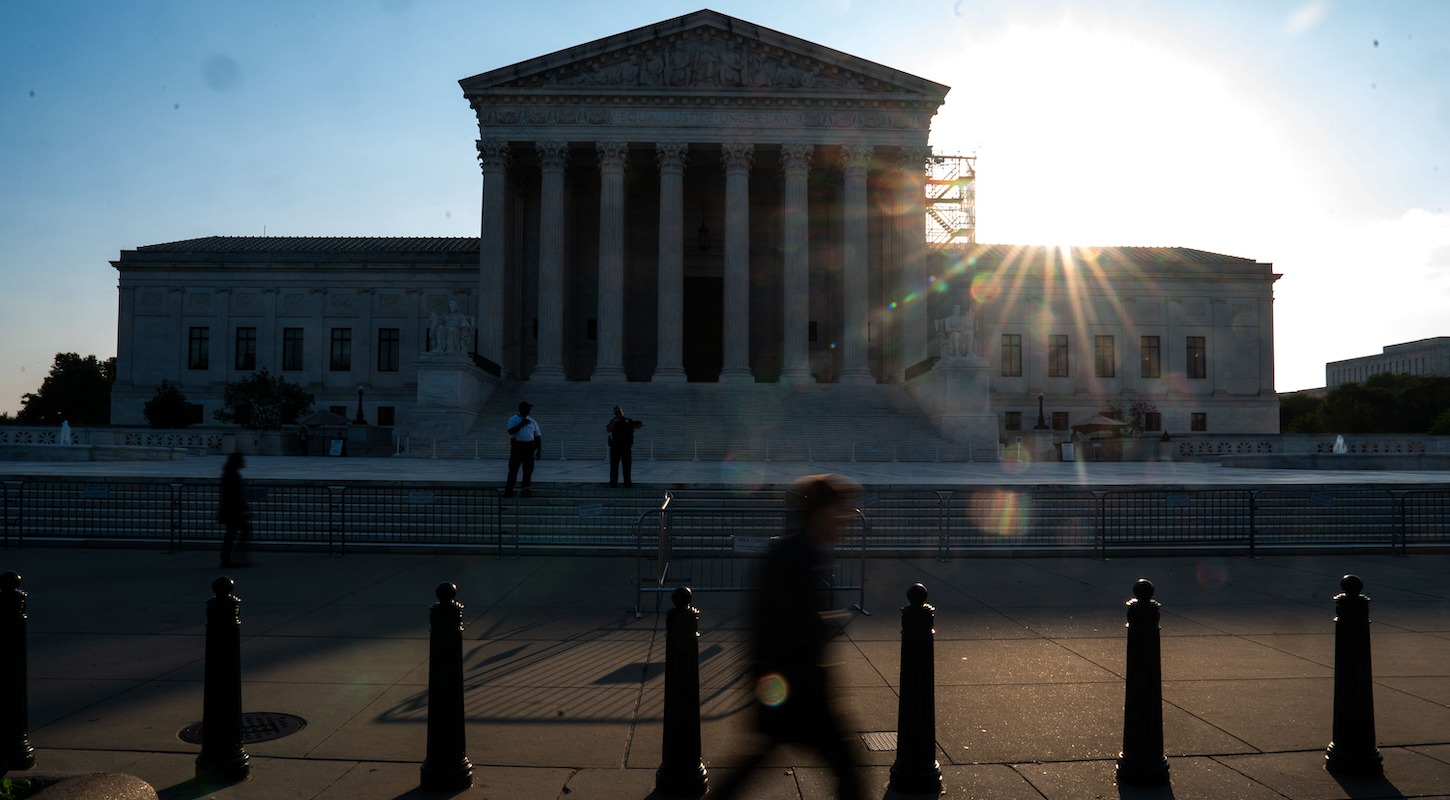Welcome to Margin of Error, a politics column from Tom Scocca, editor of the Indignity newsletter, examining the apocalyptic politics, coverage, and consequences of Campaign 2024.
The Federalist Society convention the week before last opened with a joke from a federal judge. Here was the joke, as reported by Bloomberg:
Fifth Circuit Judge Andrew Oldham kicked off the Federalist Society’s annual gathering by asking, "Oh my gosh, how excited are we about last week’s blowout victory?"
After people in the audience clapped, he delivered his punchline: He was referring to the University of Texas Longhorns' victory against the Florida Gators.
The joke was that Fifth Circuit Judge Andrew Oldham said something that could also have been interpreted as celebrating Donald Trump's victory in the presidential election. The joke was that celebrating Trump's victory would have been wildly inappropriate and partisan for a federal judge. But the joke was also that everyone in the room easily understood the ambiguity, because the assembled judges and legal scholars were, in fact, all rooting for Trump.
The joke, that is, was the joke of the Federalist Society, the United States' most active and successful partisan political organization this century, whose success depends on pretending that it doesn't practice politics at all. Abortion is now illegal in 13 states, gun control laws are in retreat, federal agencies are being stripped of their power to make regulations, and Donald Trump was free from the threat of prison and on the presidential ballot because the Federalist Society wanted all those things to happen and made them happen.
Trump's new win was an extra ladleful of gravy on an already overspilling platter. The whole point of the Federalist Society is that its backers and members have less and less need to rely on elections. They won what they needed in 2016, when the Senate's then–majority leader Mitch McConnell—backed by tens of millions of dollars from the Judicial Crisis Network, an advocacy group with the same staff and donors and street address as the Federalist Society—stonewalled President Barack Obama from filling Antonin Scalia's empty Supreme Court seat, and Trump eked out his original victory. Four years later, the court McConnell had held at a 4–4 split between Democratic and Republican presidents' appointees had a 6–3 Republican majority, with three new justices recommended to Trump by the Federalist Society.
And below the Supreme Court, Trump delivered the group a whole swath of the federal judiciary, bought and paid for. The Federalist Society's great innovation was vertical integration: Instead of the risky and generally criminal business of buying judges, its organizers set about buying judicial careers—manufacturing judges from law school on up, training them in alternative plutocratic theories of jurisprudence and then feeding them into a professional network of patronage and dependency.
The gloss on this is that the Federalist Society is simply an educational organization, that the conservative legal movement seeks to inculcate young minds with powerful theories of legal analysis such as originalism, so that they can see through the fog of a century of liberal jurisprudence to the light of the true founding principles. Its billionaire benefactors, like the now-notorious Texas real estate magnate Harlan Crow—who provided hundreds of thousands of dollars worth of undisclosed luxury travel, gifts, and hospitality to Clarence Thomas, and more free vacations to Samuel Alito—are patriots who believe in justice and intellectual integrity, which only incidentally happen to support their business interests. There are no inferences to be drawn from the news that Leonard Leo, the Federalist Society president who designed and carried out the takeover of the judiciary under Trump, moved on from his work in legal theory to launch a Republican political advocacy group, backed by a $1.6 billion gift from the Chicago manufacturing mogul Barre Seid.
Oldham joined the Federalist Society in 2002, when he was a student at Harvard Law, and went on to clerk for Federalist Society member Samuel Alito on the Supreme Court. Trump appointed him to the federal bench in 2018, at the age of 39, and Senate Republicans confirmed him on a 50–49 party-line vote. He was one of six judges Trump put on the Court of Appeals for the Fifth Circuit, giving Trump more than one-third of the seats on the circuit—a circuit that has since operated as a laboratory for furthest-right opinions, issuing a barrage of decisions completely contrary to existing law and precedent, to see which ones the Supreme Court majority is willing to entertain. It was Oldham and his colleagues who made it possible for the Supreme Court to legalize bump stocks on assault weapons, for instance, and who successfully struck down the Securities and Exchange Commission's power to issue penalties for fraud without a civil jury trial.
In a panel discussion later on the same day of the convention, Oldham's Fifth Circuit colleague Edith Jones, a Ronald Reagan appointee, launched into a tirade against her fellow panelist, law professor Steve Vladeck, accusing him of making personal attacks on judges. What she meant was that Vladeck has criticized the way the district courts under her circuit operate, with single-judge jurisdictions that enable plaintiffs to select a particular judge by selecting a particular city in which to file their case.
The judge-shopping became so blatant that the Judicial Conference of the United States, the body of judges that sets guidelines for the federal judiciary, tried to put a stop to it, only to have the chief judge of the Northern District of Texas refuse to accept the recommendation. The Northern District of Texas includes the single-judge courthouse in Amarillo, the seat of Federalist Society member Matthew Kacsmaryk, who was appointed by Trump in 2019 after a two-year struggle to push him through the Senate. Kacsmaryk is a pure reactionary activist who doesn't even pretend to be constrained by the law—anti-abortion forces went to Amarillo to ask Kacsmaryk to ban mifepristone, and he obliged by suspending the FDA's two-decade–old approval of the drug, redefining the statute of limitations and invoking the Comstock Act along the way—and his rulings regularly have to be mopped up by the higher courts.
Waving a manila folder with printouts of Vladeck's tweets and blog posts poking out at the edges, Jones accused the professor of impugning Kacsmaryk's motives and the legitimacy of the courts. She read aloud posts in which Vladeck had described plaintiff's ability to pick particular judges as a problem and had described Kacsmaryk as probably being further to the right than any of the judges on a liberal-dominated circuit were to the left. "If that's not an attack on the character of the judge I don't know what is," Jones said. Then she declared that Kacsmaryk is under full-time protection ("He has five kids") because of a death threat against him.
When Vladeck protested that he was "trying to raise awareness of an issue," Jones snapped back: "Well, it's not going to be an issue starting in January."
In case people missed Jones's partisan taunting—in the name of defending the courts' unbiased legitimacy—Mitch McConnell went to the Senate floor on Monday to praise her for seizing the "chance to respond to those who seek to undermine the integrity of the judiciary." Outraged liberals were complaining about her behavior, he said, because "bullies always cry foul when they’re the ones who get punched right in the nose."
Someone concerned about appearances might not want to have their independence praised by the Republican senator who broke precedent in two opposite directions—including the precedent he'd set himself—to steal two Supreme Court appointments out from under Democratic presidents. But the Republican legal movement is long past caring about appearances. The moderator of the panel with Vladeck and Jones was James Ho: one more Federalist Society–trained Trump appointee to the Fifth Circuit, who was sworn into office as a member of the independent federal judiciary in a private ceremony with Clarence Thomas in Harlan Crow's library.
Who's going to stop them? Now the Federalist Society is looking at four more years of lifetime appointments under Trump, at least two of those years with a Republican Senate. Maybe they can seize majorities on a few more circuits, or even push the Supreme Court majority to 7–2. On another panel at the convention, the next day, the Columbia law professor Philip Hamburger declared that the administrative state has reached "the tipping point when it starts to fall and fall. Won't that be jolly?"
Then he dived under the table, came up with a bottle of champagne, and gave a little whoop as he managed to get the cork popped. He walked down the table to start pouring glasses for his fellow panelists, including Judge Neomi Rao, appointed by Trump to the D.C. Circuit seat vacated by Brett Kavanaugh's promotion, and Judge Kathryn Mizelle, appointed by Trump to the Middle District of Florida at the age of 33, who threw out the CDC's COVID mask mandate on planes and trains because she claimed that the word "sanitation" in the law could only refer to the act of cleaning something, not the act of preventing the spread of germs.
With the judges and the others served, Hamburger raised his glass: "The glasses are full, but I want them to overflow, right? May our glasses all overflow. I have a toast, and the toast is a long one."
It was a long one: "To Jarkesy," Hamburger said, invoking the 6–3 decision in which the Supreme Court had upheld the Fifth Circuit's limits on the SEC's power to punish securities fraud. "To Axon/Cochran, to Corner Post, to Loper Bright, to Relentless, and all the other wonderful cases"—four more decisions, three of them 6–3 for the Federalist Society majority, overturning decades of established federal regulatory powers—"and to all of you. To all of you who seek a revival of our constitutional freedoms. Bravo!"
"Hear, hear!" said the panelists, and the judges drank the toast.






